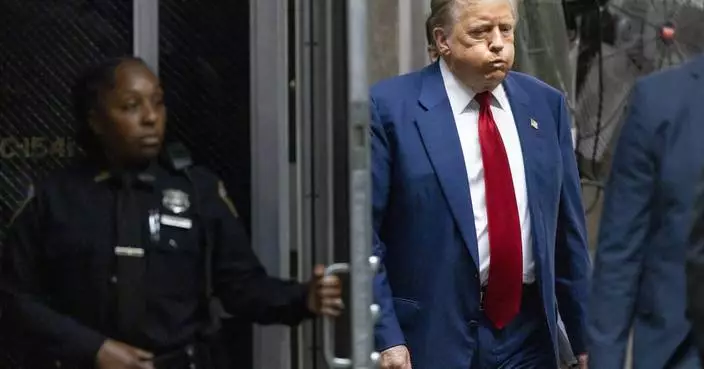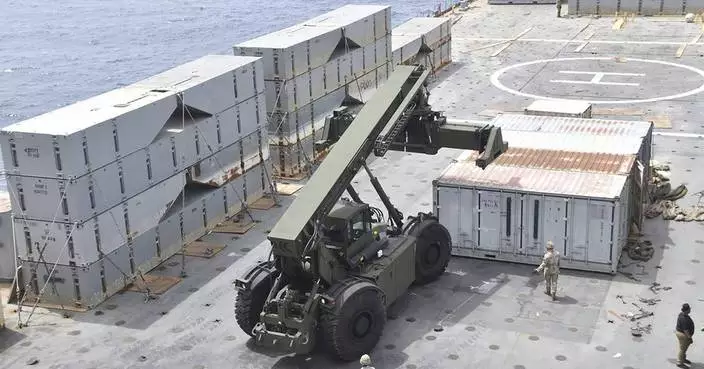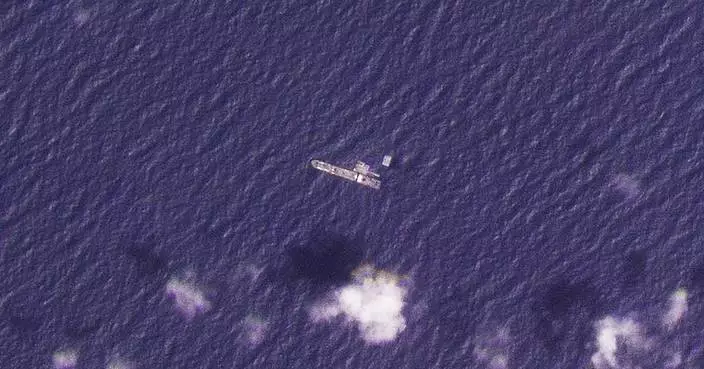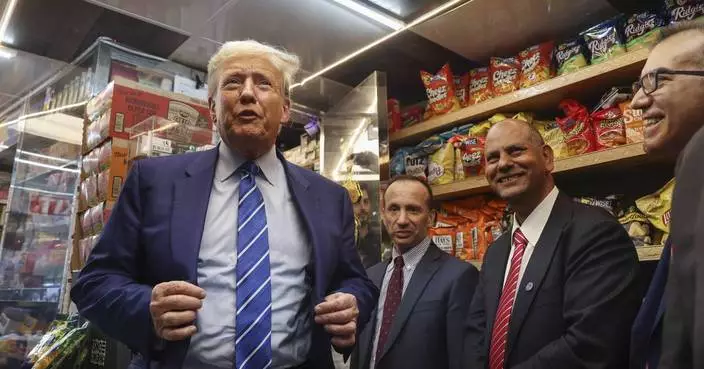Asian Americans are pushing for a Smithsonian gallery of their own on Washington's National Mall.
A $25 million fundraising drives kicks off with glitzy, celebrity-filled party in Los Angeles Saturday.
Lisa Sasaki, who is the director of the Smithsonian Asian Pacific American Center, says permanent space would provide recognition of a group with a rich American history.

From left, members of the An family, Catherine, Elizabeth, Helene and Basilika pose for a photo at the family's restaurant Crustacean Beverly Hills Monday, May 13, 2019, in Beverly Hills, Calif. On May 18, the Smithsonian Asian Pacific American Center launches a $25 million fundraising drive for permanent gallery space on the National Mall in Washington, D.C. with a glitzy party in Los Angeles full of celebrities and politicians. (AP PhotoMarcio Jose Sanchez)
The Smithsonian's Asian Pacific American program was founded in 1997 and staged its first exhibition the following year.
Asian Americans are the fastest growing minority in the U.S. and have been migrating to the U.S. in significant numbers since the 19th century.
The mall has museums dedicated to Native Americans and African Americans. The Molina Family Latino Gallery is scheduled to open in the Smithsonian's National Museum of American History in 2021.

Helene An walks in the kitchen of her family's restaurant Crustacean Beverly Hills, Monday, May 13, 2019, in Beverly Hills, Calif. On May 18, the Smithsonian Asian Pacific American Center launches a $25 million fundraising drive for permanent gallery space on the National Mall in Washington, D.C. with a glitzy party in Los Angeles full of celebrities and politicians. (AP PhotoMarcio Jose Sanchez)
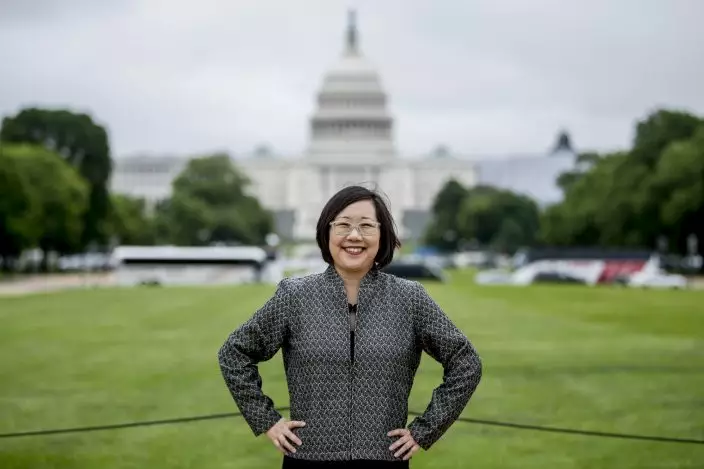
Lisa Sasaki, the director of the Smithsonian Asian Pacific American Center, poses for a photograph in front of the Capitol Building on the National Mall in Washington, Monday, May 13, 2019. On May 18, the Smithsonian Asian Pacific American Center launches a $25 million fundraising drive for permanent gallery space on the National Mall in Washington, D.C. with a glitzy party in Los Angeles full of celebrities and politicians. (AP PhotoAndrew Harnik)

From left, members of the An family, Elizabeth, her mother Helene, daughter Basilika and sister Catherine pose for a photo at the family's restaurant Crustacean Beverly Hills Monday, May 13, 2019, in Beverly Hills, Calif. On May 18, the Smithsonian Asian Pacific American Center launches a $25 million fundraising drive for permanent gallery space on the National Mall in Washington, D.C. with a glitzy party in Los Angeles full of celebrities and politicians. (AP PhotoMarcio Jose Sanchez)
WASHINGTON (AP) — The United States on Wednesday imposed new sanctions on hundreds of companies and people tied to Russia's weapons development program, more than a dozen Chinese entities accused of helping Moscow find workarounds to earlier penalties, and individuals linked to the death of Kremlin opposition leader Alexei Navalny.
The actions by the departments of Treasury and State target Russia’s military-industrial base, chemical weapons programs and people and companies in third countries that help Russia acquire weapons components as its invasion of Ukraine has entered its third year.
Treasury Secretary Janet Yellen said the action “will further disrupt and degrade Russia’s war efforts by going after its military industrial base and the evasion networks that help supply it.”
The Senate, meanwhile, gave final approval to legislation barring imports of Russian uranium, boosting U.S. efforts to disrupt Russia’s war in Ukraine. Democratic President Joe Biden is expected to sign the bill into law.
About 12% of the uranium used to produce electricity at U.S. nuclear power plants is imported from Russia, according to the U.S. Energy Information Administration.
A spokesperson for the National Security Council said Wednesday that Biden shares lawmakers’ concerns about U.S. reliance on Russia for low-enriched uranium to support its domestic nuclear fleet.
Included in the administration's announcement are importers of cotton cellulose and nitrocellulose, which are used to produce gunpowder, rocket propellants and other explosives. The penalties also target Russian government entities and people tied to Russia's chemical and biological weapons programs, companies related to Russia's natural gas construction projects and three workers at the penal colony where Navalny died.
Russian President Vladimir Putin has railed against earlier rounds of U.S. and Western penalties, claiming they are “illegitimate sanctions” on his country.
A group of 16 targets in China and Hong Kong, most of which are related to Russian procurement workarounds, are named by the Biden administration.
Yellen traveled to Guangzhou and Beijing last month to warn Chinese officials that they “must not provide material support for Russia’s war and that they will face significant consequences if they do."
China has said it is not providing Russia with arms or military assistance, although Beijing has maintained robust economic connections with Moscow, alongside India and other countries, as the West imposes sanctions.
Companies in China, Azerbaijan, Belgium, Slovakia, Turkey and the United Arab Emirates were accused of helping Russia acquire technology and equipment from abroad. The penalties aim to block them from using the U.S. financial system and bar American citizens from dealing with them.
Biden last week said he would immediately rush badly needed weaponry to Ukraine as he signed into law a $95 billion war aid measure that also included assistance for Israel, Taiwan and other global hot spots.
The upcoming uranium ban is also expected to impact Russian revenues by at least $1 billion. The U.S. banned Russian oil imports after Russia invaded Ukraine in early 2022 but did not against uranium, despite frequent calls to do so by U.S. lawmakers in both parties.
Wyoming Sen. John Barrasso, the top Republican on the Senate Energy and Natural Resources Committee, called the import ban “a tremendous victory” and said it “will help defund Russia’s war machine, revive American uranium production and jumpstart investments in America’s nuclear fuel supply chain.″
“Wyoming has the uranium to replace Russian imports, and we’re ready to use it,″ Barrasso added.
West Virginia Sen. Joe Manchin, a Democrat who heads that Senate committee, said it was "unconscionable” for the U.S. to help make it possible for Putin to “finance his unlawful war against Ukraine” through U.S. reliance on Russian uranium.
Besides the import ban, the legislation frees up $2.7 billion in previously authorized funding to ramp up domestic uranium production.

FILE- This June 6, 2019, file photo shows the U.S. Treasury Department building at dusk in Washington. The United States has imposed new sanctions on hundreds of firms and people tied to Russia’s weapons development program, more than a dozen Chinese firms accused of helping Russia find workarounds to sanctions and individuals tied to the death of Russian dissident Alexey Navalny. The sanctions imposed Wednesday by the Treasury and State departments target Russia’s military-industrial base, chemical weapons programs and people and firms in third countries that help Russia acquire weapons components as its invasion of Ukraine has entered its third year. (AP Photo/Patrick Semansky, File)











